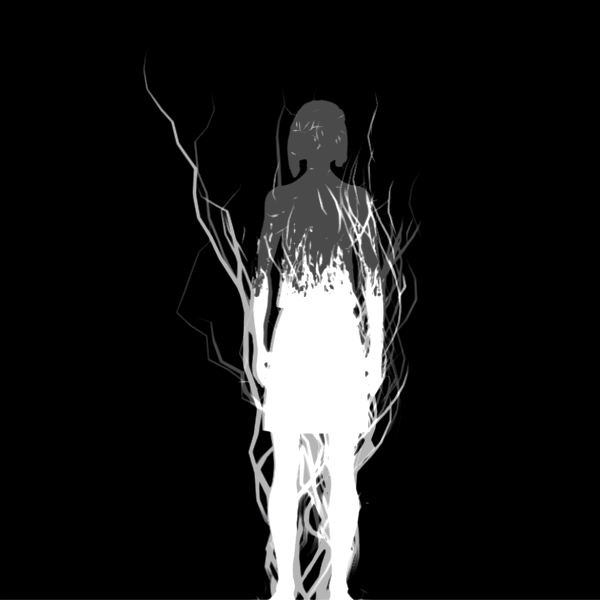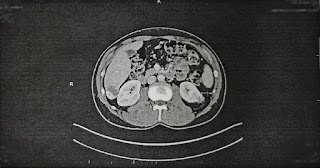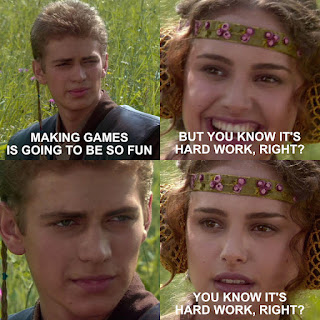How Indie Game Development Adds to the Stresses of Life— But Also Provides an Escape
By David Board
One night in November of 2016, I found myself on a dirt pathway, carefully scooping handfuls of sand, pressing them down into the ground, smoothing and sculpting the terrain. I grabbed rocks, smacked them down into the dirt, then smoothed the area again with more sand. I was building the world of a new video game with my bare hands—one grain of sand at a time. Of course, this was a dream, but when I uncomfortably awoke and comprehended it wasn’t real, I also realized this dream perfectly summarized the journey of my last seven years creating—and marketing—an indie game.
Creating Lifeless Planet was an incredible story, though one you’ve probably heard before. A spark of an idea, a “wildly successful” crowdfunding campaign, a deal for Steam distribution (back then, you could only get on Steam with a publisher), and platform commitments for all three major game consoles.
Living in Alaska at the time, it was a dream come true to be traveling to places like London to sign a publishing agreement and to Seattle and Los Angeles to exhibit my game at major expos. The whole experience was a series of surprisingly fortunate events. And sure, they came after enormous effort and a fair bit of planning on my part, but I know of so many fellow indie devs who worked even harder than I have but who got unlucky with the timing or context of their release. A lot of amazing indie games haven’t received their due attention.
So I consider myself lucky. In the end, Lifeless Planet has sold hundreds of thousands of copies, more than paying for my time and effort over some three years of development. Long after release I received what amounted to a year of income for a deal that got the game distributed to millions more people through the Epic Games store. We actually made enough income to put a downpayment on our house and to seed the next chapter of our little studio.
But with my next game, it started to feel like my luck was running thin. I was able to meet my funding goal on Kickstarter, but the income level that seemed so heady in the early days of Kickstarter was now pretty modest. And it was during the Kickstarter campaign that the headaches started.
The Brain Scan
Actually, the first symptom was an explosion of vertigo one morning. Bending over the sink, it almost dropped me to the floor. Standing up again I was fine, but I soon discovered I couldn’t tilt my head or lay down without sending the room spiraling wildly around me. Over the next few days, other symptoms joined in, including intense headaches and ringing in my ears—more of a loud, discordant rumble than the ringing of tinnitus I’d experienced from time to time in the past.
At first it seemed reasonable to think I had a mundane infection that was messing with my sinuses and my inner ear that provides a sense of balance. Two separate doctors confirmed my self diagnosis and prescribed various cold medicines and antibiotics to clear up the infection.
But the infection didn’t clear up. The symptoms did slowly lesson, but weeks later they persisted, some days worse than others. I saw a couple of specialists, but it was the neurologist and an MRI that provided an answer. Thankfully, the scan was clear of anything scary, so that left one clear possibility: vestibular migraine. Essentially, for a number of reasons, but probably exacerbated by stress, my brain was overreacting to stimuli—sounds, neck muscle movements, bright light—were sending a shockwave of activity through my head.
I was just one of the unlucky folks who get daily migraines, and there wasn’t much to do. It would lessen over time, the neurologist said, but probably not ever go away completely.
Fun way to start my sophomore game project.
But graciously, the migraines did subside over the next year or so. The vertigo eased first, and then the daily headaches. I remember one day thinking, “Oh wow it’s been a few weeks since it sounded like there was a garbage truck in the next room.”
(July, 2023: Wow, shortly after I wrote that last paragraph I started to experience acute swelling in my left arm. Went to an emergency room and a few hours later was diagnosed with an extremely rare kind of blood clot. So add to the list of odd medical experiences a potentially life-threatening condition, just weeks from game release as I’m trying to wrap up production. And I haven’t even gotten to the part about the kidney cancer!)
A Tiny Tumor
In the meantime, in the thick of the pandemic I started having some stomach aches. But they weren’t severe, and I debated whether I should even bother with a doctor’s appointment. It was an anxious time to be visiting places where sick people were hanging out. At the last minute I decided to go ahead. At the clinic, the doctor didn’t seem to think there was anything too wrong, but ordered a couple tests just to be safe. One was a CT scan of my abdomen.
The next day I got a call from a technician: there were no problems found with my digestive system. However, there was a concerning spot in my kidney. I knew what this meant, so by the time I got a call back from a doctor, I’d already researched kidney cancer. What I found wasn’t encouraging as kidney cancer is virtually unsurvivable if it spreads. But catch it early and there’s an over 90% survival rate. Based on the size of the tumor it seemed to me it was early.
Once I talked with the doctor he confirmed it was stage 1 with no spreading and we were super lucky to find it at this small size. His exact words were, “It’s one of those happy accidents,” since we detected the tumor when we were actually looking for something else.
I met with a specialist a few days later and he said we could remove the kidney, or just part of it, or at this very early stage we could just monitor it. He assured me there is no chance of it spreading when it’s so small. I suggested since the pandemic was raging that we go with the option of monitoring it for now instead of going straight to surgery and time in the hospital. Besides, I would be done with the game soon (ha!), and then it would be a better time.
So there was another CT scan in a few months, and no change in the tumor. Then another a few months later, and another, and another. Each time no change whatsoever. “It’s either benign or very slow growing,” according to the doctor.
I’m thankful to have zero symptoms from the tumor, and have been able to avoid surgery. But it’s a stressor. Am I doing the right thing by deferring treatment? Is it even actually cancerous (biopsies aren’t conclusive, I am told)? As test after test showed no change, these worries have dropped to background noise, but they still persist—adding another data point of stress to an already stressful time.
A Very Rare Clot
As I write this, I’m less than two weeks away from release day! After seven long years of development, working off and on between projects and responsibilities, my game is almost ready for sale. But last week one more health challenge popped up. On Wednesday night my left arm suddenly swelled up and turned dark red. I knew it was a blood flow problem, and I worried it might be a heart condition. We were turned away by two urgent care clinics but finally made it to an emergency room. After a few hours and more scans, I got the verdict: I have a very rare form of blood clot in my shoulder.
I’m in great health, all things considered. I eat healthfully, workout regularly, and yes have even learned how to manage stress (let’s face it: I’ve had to!). My particular clot happens mostly to younger active people when a major vein in your shoulder gets compressed by your collarbone. Activities like rock climbing can contribute to this, and I’ve climbed off and on my whole life.
After the initial stress and worry that the clot could cause a pulmonary embolism or even death, the specifics of my case became more clear, and now it seems there’s a chance I may not even need to treat it. My arm is mostly back to normal as other veins in the area are carrying the load, so to speak. Surgery is still very much on the table, but if we do it that will probably be in a month or two. It’s looking like just one more stressor involving lots of doctor appointments and research, but this time only days before release of the game.
Making Video Games Is Fun… Right?
But as mentioned above, I have learned to pace myself, to take breaks, to listen to my body. And I am truly healthier than I’ve been in years, in spite of my health surprises. Taking time to work out, to go for walks, to cut out work in the evenings (mostly) has made it possible for me to keep slogging along in spite of the seemingly endless to-do list and the stresses of life.
What’s more, I love this game! I’ve played each level and each sequence over and over again, hundreds upon hundreds of times. Ever get a song stuck in your head? For me, it’s all Lifeless Moon music, all day, every day. But the fact that after so many years working nearly non-stop I can still see the beauty of it, speaks to my passion for this story, and for gaming in general.
There are a lot of dark moments in Lifeless Moon, as in Lifeless Planet before it. But you’ll notice a sense of hope and an aspiration towards love and kindness in my stories. I believe interactive media is especially suited for inspiring people to become better versions of themselves. And of course, games are about having fun! Experiencing fantastic moments, exploring mysterious places. I particularly love the empowerment game development gives me to build new worlds and then share them with others. For me, the creative aspects of game development are especially therapeutic.
I can also credit the endless slog of game development as providing a distraction to some of the heavier things in my life. When you have something positive to do—and a lot of it—there’s little time to get bogged down in despair. This isn’t universally true, and I know many folks struggle to overcome mental health and physical health challenges that no amount of distraction can help with. But I am thankful that in my case I was able to preoccupy my mind with productive activities, and game development has been at the top of that list.
I also believe games can have meaning beyond the joy they bring. I mentioned my days are spent building digital experiences for science education. The insights of science and the critical thinking skills taught in the practice of science are uniquely able to expand humanity’s understanding of the universe and guide us to solve the big problems of life on Earth.
And to that end, I believe content creators can infuse education into games. And not just science education—though these topics lend well to science fiction games like Lifeless Moon—but all kinds of education. I wrote about this a few years ago for Indie MEGABOOTH in a post titled, “Embedding Education.” I’m particularly excited about the ability for media creators to include content and themes that can inspire audiences to learn and grow, and I try to practice this with my game projects as well.
Finding Meaning Through Game Development
I’ve been forced to think about my mortality the last few years. None of us will live forever, but I’ve had moments where it seemed the end could be coming sooner than later. Yet in those moments, I was surprised to find I wasn’t as alarmed at the idea of death as I expected to be. Don’t get me wrong, I desperately want to live a long and healthy life. I have a hundred projects I want to complete, and countless things I want to do. But dying doesn’t consume me with worry, in part because I feel like I’ve contributed something meaningful to the world. I’ve been lucky enough to be able to pursue my passions and to share them with others who also found joy in my work.
What’s more, the community of indie developers and educators that make up my professional circle are home to some of the kindest, quirkiest, and most creative folks on the planet. This has helped open my soul to new experiences and new perspectives. And it’s confirmed what I’ve always known: as bad as things may seem for me, someone else is dealing with even bigger challenges. I’m in awe of so many of you.
I delayed for a long time speaking in any specifics about some of the things I’ve dealt with these last few years, but there’s also therapy in sharing my struggles. And despite the scariness of my health issues, I’m happy to say I feel better than I have since I was a teenager, and that seems worth sharing too.
I’m so thankful for the encouragement I’ve received from my supporters, from other developers, and my publisher. I’m also grateful for the “happy accidents” that got me this far. I don’t know what the future holds after Lifeless Moon, but I do know I’ve poured my heart into it. I used to think developing the game was just that: giving myself, my time, my energy to something. But looking back, I see that, in the process, it was giving me something of immeasurable value in return.



